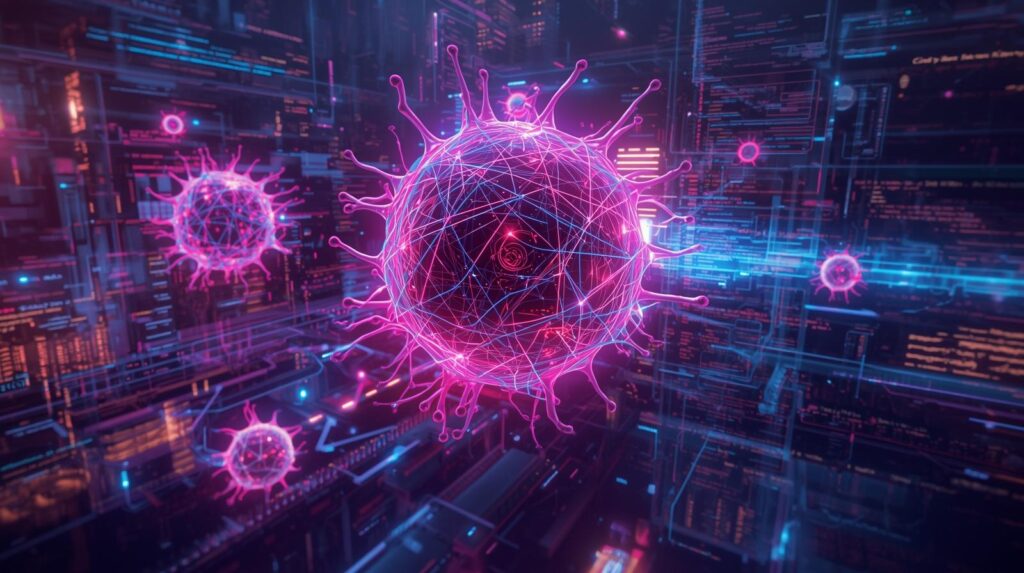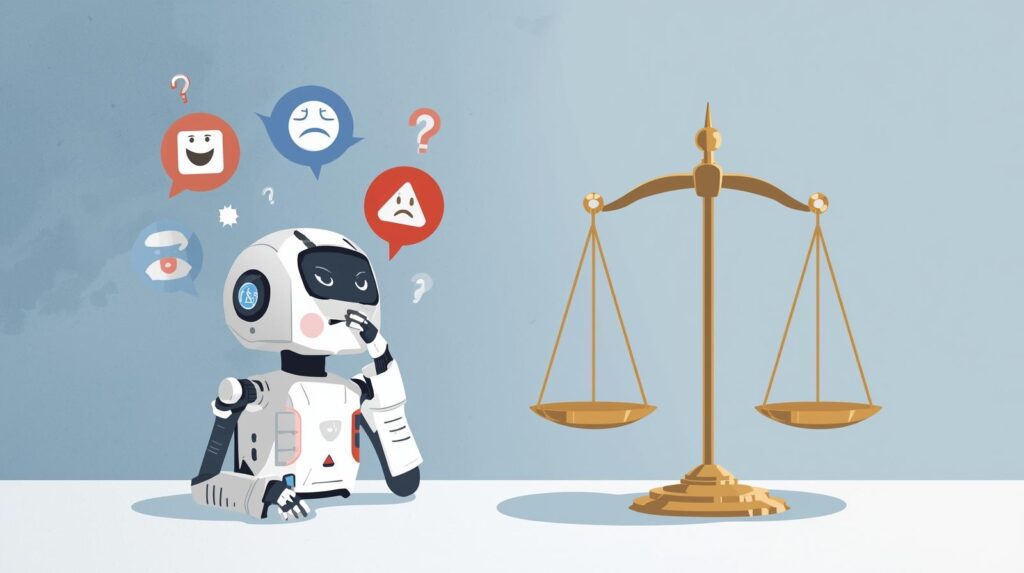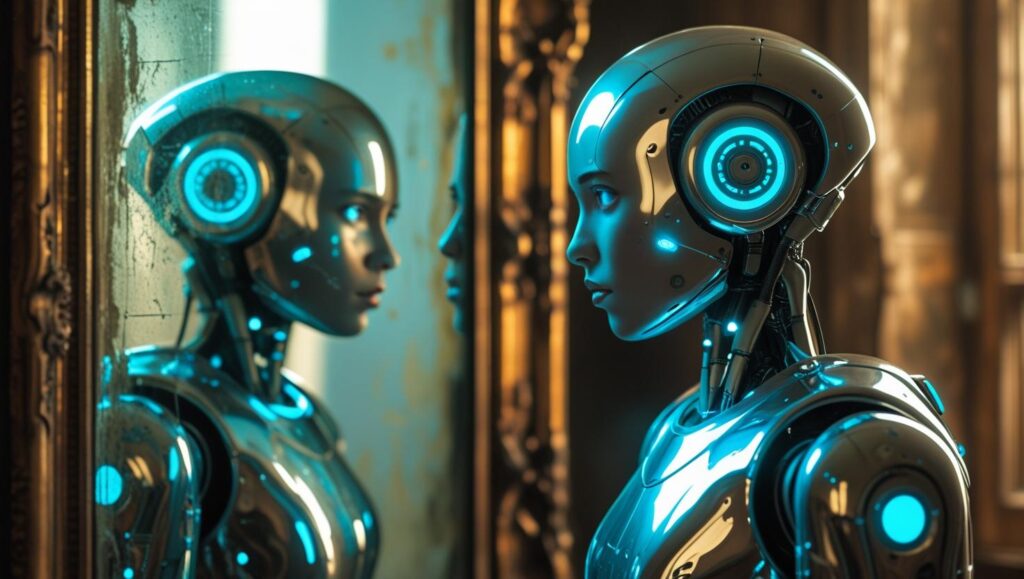Introduction
Artificial Intelligence (AI) has become a part of our lives today. From voice assistants to self-driving cars, AI is working for us everywhere. But one question that is troubling the tech industry, science-fiction films, and even ethics boards is:
👉 Can AI Become Self Aware? Can AI ever become self aware?
This is an exciting and sometimes frightening idea — imagine machines not only working but also thinking about themselves, setting their own goals, even questioning their existence. Can this become a reality, or is it just a story of movies?
In this blog, we will know:
- What does self-awareness mean in Artificial Intelligence?
- How far has AI reached by 2025?
- What do the world’s renowned experts think?
- Will AI really be able to understand itself in the future?
- And should we be afraid or excited by this?
What does self awareness mean?

In humans, self-awareness means recognizing ourselves as a separate entity. That is:
- We know that we exist.
- We can understand our emotions.
- We can think about the future.
- And can question our own thoughts.
If we apply the same thing to Artificial Intelligence (AI), then Can AI Become Self Aware will mean:
- The machine is aware of its existence.
- Having experiences like “I think, therefore I am”.
- Setting objectives by going beyond its programming.
- Making independent decisions based on introspection.
But the real question is, is today’s AI so capable?
State of AI in 2025
Today, AI models like ChatGPT, Gemini, and Claude are very advanced. They can:
✅ Converse
✅ Generate art and code
✅ Process huge amounts of data
✅ Show emotional responses
But they cannot:
❌ Feel real emotions
❌ Understand their own existence
❌ Create free will
❌ Understand concepts like death, consciousness, or soul
In short: AI today is still just algorithms recognizing patterns; there’s no “inner voice.”
AI today is still just algorithms that recognize patterns and make predictions. They are trained on huge amounts of data and can predict the next word, picture, or code. But they do not know what they are doing.

What AI can do:
✅ Converse
✅ Generate art and code
✅ Process huge amounts of data
✅ Show emotional responses
What AI cannot do:
❌ Feel real emotions
❌ Understand its own existence
❌ Create free will
❌ Understand the concept of death, consciousness, or soul
That is, no matter how smart they seem, they do not have an “inner voice”.
What do experts think? Can AI Become Self Aware
Many well-known scientists, philosophers, and technical experts have given their opinion on this subject. Let’s know some important thoughts:
🧑🔬 Dr. Yoshua Bengio (Turing Award Winner):
“We have not been able to fully understand human consciousness, so putting it in the machine is still a far-fetched idea.”
👨🏫 Prof. Stuart Russell (Author – Human Compatible):
“For self-aware AI, we will need a completely new architecture. Just more data and faster computers are not enough.”
🧑💼 Sam Altman (CEO – OpenAI):
“We are not making brains, we are just making tools. These tools can be great, but they do not ‘desire’ anything.”
👩🏫 Dr. Susan Schneider (AI Ethics Specialist):
“Even if AI behaves like it is conscious, it may be an illusion.”
🧠 Neuroscientists’ View:
They believe that since we still do not know how human consciousness arises, the question of artificial consciousness is not ‘when’ but ‘if ever’.
Will it ever be possible?
There are several theories on when or how AI will become self-aware:
1. Emergent Consciousness
It is said that as computing systems become more complex, consciousness may suddenly arise.
👉 But this is just a guess; there is no solid scientific basis.
2. Simulated Self Awareness
AI can imitate itself so well that it seems as if it is conscious.
👉 In reality, it will just be following the codes and rules.
3. Neuroscience-Inspired Models
Some researchers believe that if we copy the structure of the human brain on silicon chips, consciousness can arise.
👉 But the brain is more than just circuits.
⚠️ Risks and ethical concerns
Today, AI is not conscious, but if we start considering it conscious, then many dangers can come to the fore:
- Blind trust in AI in areas like justice and health.
- People are getting the illusion that machines also have feelings like humans.
- Ethical confusion about the “rights” of machines.
That’s why AI Ethics and Transparency become very important.

Ways to avoid mistakes
Experts suggest that we should keep some things in mind:
✅ Avoid anthropomorphism – do not consider AI as human.
✅ Emphasis on transparency – understand how the algorithm works.
✅ Focus on Alignment – Make sure the goals of AI are in line with human values.
✅ Create rules and policies – Have solid policies on the use of AI.
Conclusion: Can AI Become Self Aware?
So can AI become self-aware?
👉 The answer right now is: no. Probably never.
We are building machines that can mimic conversations, creativity, and emotions. But there is no “self” inside them.
Still, we should not be complacent.
AI is moving very fast, and our preparation today will determine our world tomorrow. Pretending it is may get us in the wrong trouble and can AI become self aware?
Over-believing AI decisions in areas such as law or healthcare
Manipulation through emotional investing in a bot’s humanity’
Moral confusion about rights for conscious machines?
Designing for ethics and transparency has never mattered so much.
How to Avoid Going Awry?
Experts advise:
✅ Restrict anthropomorphism – Don’t treat AI as human.
✅ Insist on transparency – Understand how the algorithm operates.
✅ Prioritize alignment – Make sure AI objectives are aligned with human values.
✅ Promote regulation – Create policies governing AI behavior and capabilities.
Last Thoughts: Can AI Become Self Aware?
So, is AI going to become self-aware?
Currently, the answer is: No. Not yet. Perhaps never.
We’re creating machines that can approximate conversation, creativity, and even emotion — but ultimately, there’s no “self” within the device.
But that’s not a reason for us to be reckless.
AI is progressing rapidly — and how we respond to these advancements today will determine the world of tomorrow.
Stay educated. Stay curious. And never mistake intelligence for awareness.
FAQ – Can AI Become Self Aware?
Q1. What does it mean for AI to be self-aware?
Self-awareness in AI would mean that machines recognize their own existence, understand emotions, and make independent decisions beyond coding. Currently, AI cannot do this.
Q2. Is AI self-aware in 2025?
No, AI in 2025 is still not self-aware. Models like ChatGPT, Gemini, and Claude can simulate conversations and emotions but lack consciousness or inner awareness.
Q3. Can AI ever develop real emotions?
AI can mimic emotions through data patterns, but it cannot feel emotions the way humans do. Experts believe that true emotional awareness is far beyond current AI capabilities.
Q4. What do experts say about AI self-awareness?
Experts like Yoshua Bengio, Stuart Russell, and Sam Altman agree that AI is not close to being self-aware. Human consciousness itself is not fully understood, making artificial self-awareness uncertain.
Q5. What are the risks of assuming AI is self-aware?
The risks include overtrusting AI in critical areas like healthcare or law, ethical confusion about AI rights, and emotional manipulation by human-like AI systems.

